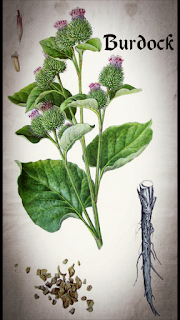Herbal Medicine: Calendula
Calendula Officinalis
Native to Southwest Asia, West Europe, the Mediterranean, and Macaronesia; Calendula has been in use as a medicine since at least the 11th Century.
The Ancient Egyptians believed that Calendula contained sacred revitalizing properties.
Calendula is known as "Ropana" in Ayurvedic medicine, which means "one which heals wounds." It is used for vulnerary, as an antispasmodic, alterative; and used on minor wounds, as an eye wash, to soothe bee stings, & for digestion disturbamce.
The Chinese incorporated Calendula to move stagnant blood and increase circulation to the skin.
The Native Americans employed Calendula to calm stomach upset.
Calendula is very popular in Middle Eastern and Mediterannean cuisine, as well as in stews & soups in Germany; which is where it got its nickname "Pot Marigold."
Calendula was historically used as a liver and gall bladder cleanse.
Calendula is a diuretic, detoxifier, astringent, anthelmintic, cholagogue, diaphorhetic, hepatic, antiseptic, antioxidant, anti-inflammatory, stimulant, carminative, anti-tumor, antihemorrhagic, antiviral, antifungal, and hepatoprotective.
Calendula was used during both Americas Civil War and during WW1 for treating open wounds.
Calendula is beneficial to promoting and balancing menstruation; and reducing uterine fibroids, frigidity, and ovarian cysts.
In folk medicine, Calendula was used to hasten labor by causing contractions, and to help discharge the placenta. Furthermore, Calendula oil acts like a tonic to stomach muscles and helps balance estrogen levels.
Used in tinctures, ointment, and washes; Calendula has been and still is implemented in the treatment of skin conditions such as rashes, dermatitis, burns, bruises, abrasion, & minor infections.
*DO NOT USE Calendula if you are pregnant; talk to your doctor before use if you are currently taking prescription medications meant to treat high blood pressure, or sedatives, or medications for the treatment of Diabetes; if you are allergic to Daisies, Chrysanthemums, Echinacea, or Chamomile you might have an allergic reaction to Calendula too.*
Calendula is really quite a fantastic plant! Definitely deserves to be in your herb garden, and incorporated in your kitchen and herbal medicine.
To a healthier & happier you!
~Tanya Capps~
Herbal Witchcraft Magazine
https://www.herbalwitchcraftmagazine.com
(Our very first issue of "Herbal Witchcraft Magazine" is set to launch in October! Pre-orders available now! Be the first to receive our very first issue! Find us on Facebook by typing @HerbalWitchcraftMagazine into the facebook search bar.)




Comments
Post a Comment